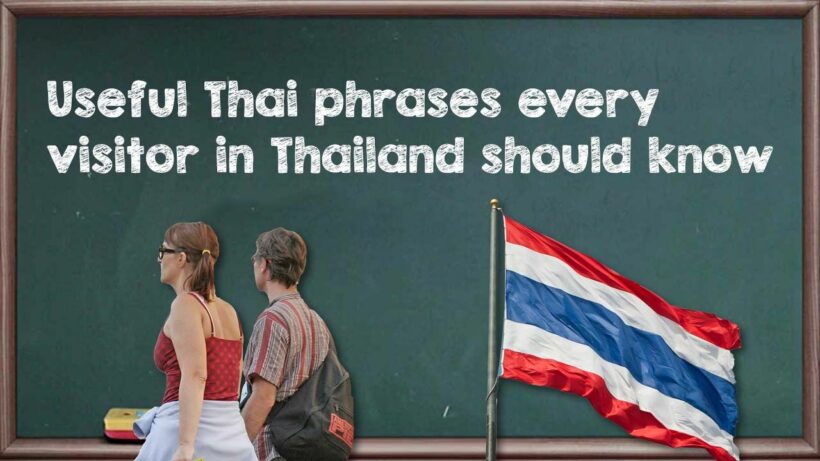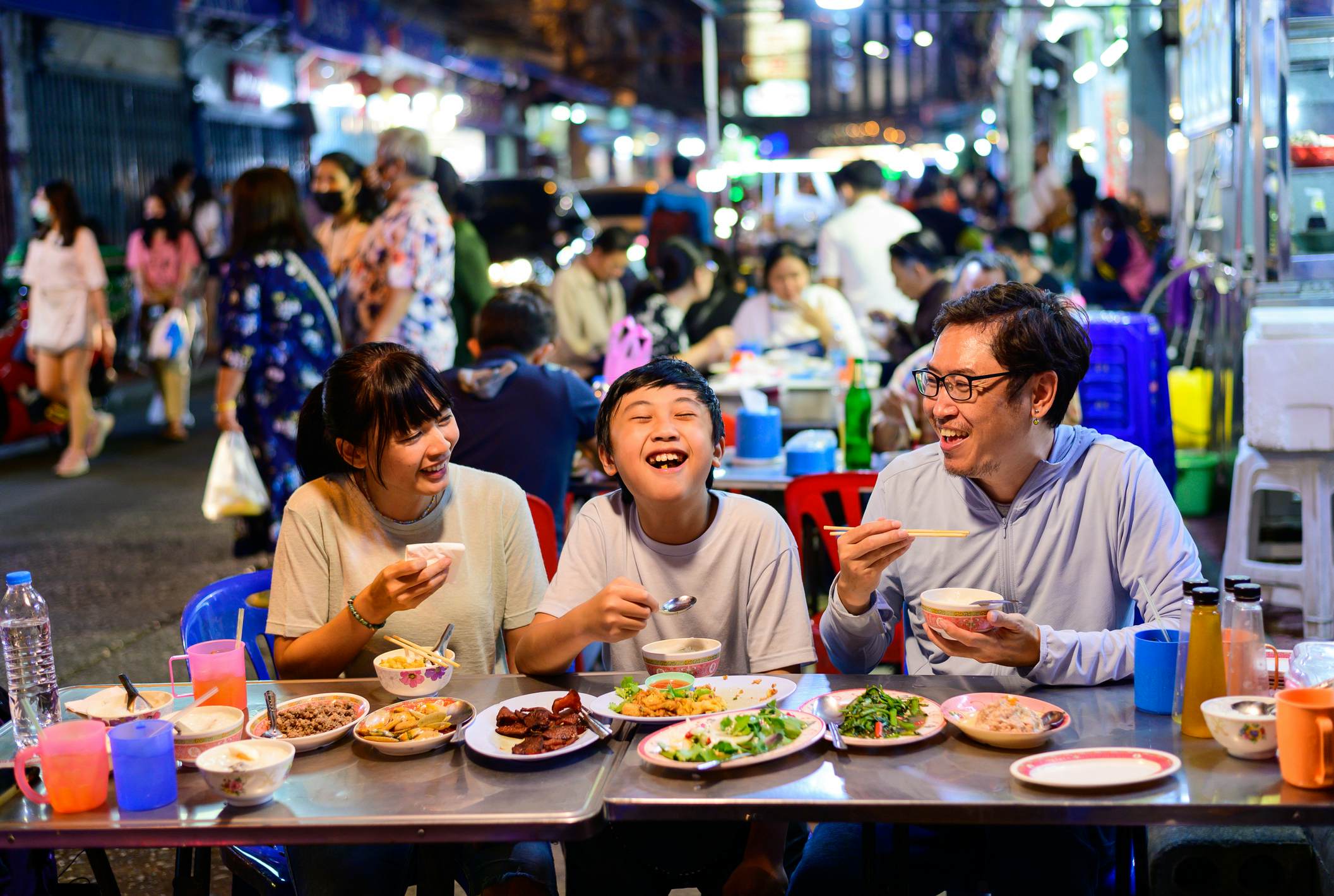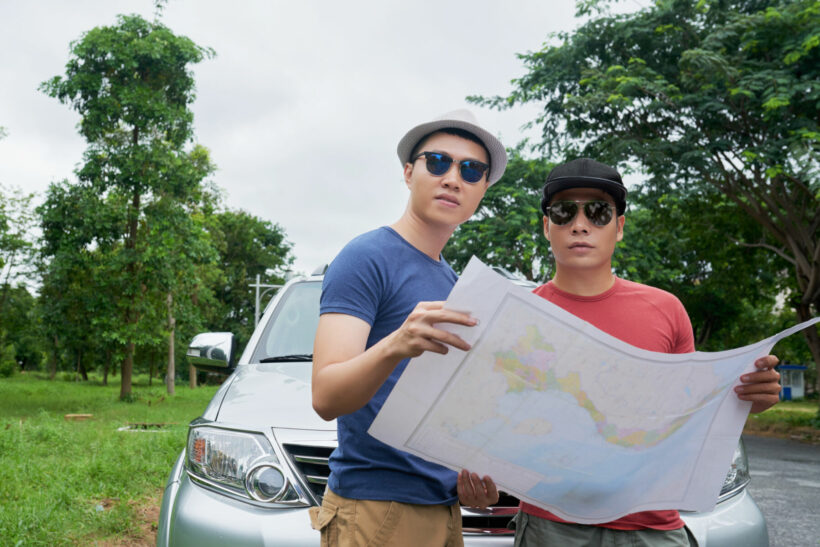Useful Thai phrases every visitor in Thailand should know

Whether you’re visiting Thailand for business or pleasure, it’s always beneficial to understand the local language. Learning useful Thai phrases means showing effort and respect for the local culture. It will help ease interactions between you and the locals, making your trip more accessible and more enjoyable. Since Thai is a tonal language, it can be challenging to learn. You’ll likely make mistakes at first, but don’t let that discourage you. Even if you pronounce something wrong, most locals will still appreciate your effort and may even help you pronounce it correctly.
Below, we’ve compiled some of the most common phrases you’ll likely use often during your time in the Land of Smiles.
The basics

–Khap and ka
Before continuing with the greetings and other useful Thai phrases, we should first cover some basic rules. To make your sentence or question more polite and respectful, it’s essential to end your sentences with the word khap/ka when you are conversing with someone in Thai.
There’s no direct translation of khap/ka in English. It’s based on the gender of the person speaking, not who you are talking to. So if you are a male, you should finish your sentence with the word khap or krap. If you are a female, complete your sentence with the phrase ka.
–Khun
Khun is a polite way to address a person. You add the word before a person’s name. While it is similar to using Mr. or Ms. in English, there’s no direct correlation to English.
Greetings and essential phrases in Thai Thai phrases
:max_bytes(150000):strip_icc():format(webp)/thailand-greeting-wai-567b2d735f9b586a9e8f5066.jpg)
Out of all useful Thai phrases, greeting someone and saying thank you are the essential Thai phrases you need to know. Mastering these Thai phrases will help connect you with the people you meet in the country.
–Hello – Sa-Wat-Dee
Sawatdee is one word you’ll probably use a lot in Thailand. It’s a way to say hi or hello in Thai, so try to use it to greet anyone who crosses your path. Don’t forget to add khap or ka at the end to make a complete, polite greeting. You might butcher the word at first, but don’t worry; most Thais will kindly help you with the correct pronunciation.
–Thank you – Khob Khun
If you want to thank someone or be polite, use khap Khun krap/kha. If you want to be more polite, try to learn to perform ‘wai,’ a Thai greeting that can also be used to say thank you.
–Sorry/excuse me – Kor Toht
You can use kor toht krap/ka to apologize or ask people for your attention. You can also use it to dismiss yourself from a setting or express condolences.
–No problem/it’s alright – Mai Pen Rai
Mai pen rai is a way to respond to someone’s apology or gratitude. You’ll most likely hear this phrase a lot in Thailand. Using mai pen rai tells the other person they’re not bothering you.
–Yes/No – Chai/Mai or Dai/Mai Dai
The words yes and no are used differently in different contexts. If someone asks you whether something is right or wrong, use chai (yes) or mai chai (no) to answer the question. However, if someone asks you about your ability to do something, respond with dai (yes – can) or mai dai (no – can’t).
I don’t understand – Mai Khao Jai.
When you don’t understand something, say “mai khao jai.” Upon hearing this phrase, the other person may try to find different ways to explain whatever they’re trying to tell you.
–Goodbye – La Gorn
When you part ways with someone, use “la gorn khap/ka” to say goodbye to them. Sometimes, a simple wai might be enough if you’re not confident enough to pronounce the phrase.
Eating and ordering in restaurants/bars

I’m hungry – Hiu
If you want to tell someone you’re hungry in Thai, just say “hiu.”
How much is this dish? – Jarn-Nee Rah-Car Tao-Rai?
Some restaurants and street food stalls may not include the price in their menu. If that’s the case, you can say, “jarn-nee rah-car tao-rai?” If the phrase is too long and hard to pronounce, you can use the shorter version: “tao-rai krap/ka?” (how much?).
Not spicy – Mai Phed
This is one of the most useful Thai phrases to remember if you can’t stand spicy foods. Thai food tends to have lots of chili and other spices, so if you don’t want to set your mouth and stomach on fire, be sure to learn to say “maiphed.”
Some restaurants and street food stalls may still put a small number of chili in your dish even after saying mai phed. Therefore, if you don’t want chili in your food, you can say “mai sai phrik,” which means “don’t put chili in my food at all.”
I want it to be very spicy – Ao Phed-Phed.
Love spicy food? Say “ao phed-phed or ao phed maak” to ensure that your dish is extra spicy.
No sugar – Mai Sai Nam Taan
Sugar is used in many Thai dishes and drinks, from coffee to noodle soup. If you want to cut some calories or you don’t like sweet drinks, simply say “mai sai namtaan.”
Takeaway – Ao Glub Baan
Want to order something to take home? Say “ao glub baan.” Since ao glub baanliterally means “take food home.”
Delicious – Aroi
If the food is delicious, don’t forget to express appreciation by saying, “aroi!”
Asking for directions Thai phrases

Don’t let anyone rip you off by knowing how to give some basic directions in Thai can. Some taxi drivers may deliberately take wrong turns to make the ride longer, so they get more money from you. Therefore, use Google Map to show them that you know the directions to your destination. Being able to direct a driver will save you so much time and money. Use “leo sai” to ask the driver to turn left, “leokhwaa” to turn right, and “dtrong bpai” to go straight.
Can you drive faster? I’m late – Kap Reo Reo Dai Mai, Chan Sai Laew.
When you’re late but the driver is slow, use this phrase to ask them to drive faster.
Slow down – Hai Chah Long
I was feeling unsafe because the driver is speeding? Say “hai chah long” if you want to ask them to drive slower.
Where is the toilet? – Hong Naam Yoo Thee Nai?
Nothing is worse than having to go to the toilet but not knowing where to find one. Therefore, remember this simple phrase and save yourself from unwanted situations.
Shopping at the market
How much is this item? – An Nee Tao Rai?
Some sellers use the infamous “farang price” for foreigners, which is way more expensive than what a Thai would pay. Asking for an item’s price in Thai can reduce your chances of paying double the original price.
Can you give me a discount? – Lot Noi Dai Mai?
When shopping in a traditional market, negotiate for a discount. In most cases, the seller will give you lower prices!
Do you have it in different colors? – Mee See Eun Mai?
Find something you like but want in another color. Ask the seller if they have the item in different colors by saying, “mee see eun mai?”
These are just a few common Thai phrases that we find helpful. Keep practicing before you fly to Thailand; you’re all set for a fantastic journey. If you are in a situation where you don’t know how to respond in Thai, just flash your best smile!
Latest Thailand News
Follow The Thaiger on Google News:


























